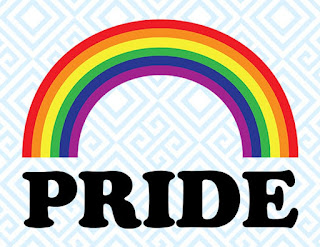I.
The Canadian psychologist, author, and cultural commentator Jordan Peterson has had his Twitter account suspended for a recent tweet which, apparently, violated their rules governing hateful conduct. The tweet, which I don't wish to discuss in full, opened with the question: Remember when pride was a sin?
It's this line - and Peterson's subsequent defence of the line - which I wish to examine here ...
II.
Speaking in a 15 minute video posted on YouTube [1], Peterson acts a little faux-surprised by what he continues to call the ban imposed by Twitter (whilst conceding that, technically, it's no such thing).
He claims - again, somewhat disingenuously - to be uncertain why it is he has had his account suspended by the socal media platform: What was it, that I said, that caused such a fuss? And even more importantly, what exactly was it that I said that resulted in the ban?
Now, Jordan Peterson is a highly intelligent and erudite individual, who chooses his words extremely carefully. So one can be sure that he didn't just post the tweet in a fit of irritation and without thinking; i.e., one can be sure that he knew precisely what he was saying and what the likely response would be.
Peterson claims that his opening statement merely refers us to a time when, as a matter of fact, pride was regarded as a sin. And, yes, okay, there was such a time - a long drawn out period which we might refer to as the Christian era [2] - when pride, along with six other capital vices or deadly sins [3], was contrasted with heavenly virtue.
Indeed, it's even true that pride was thought to be the root cause of all sins, as it's human pride which turns the soul of man away from God. And pride, Peterson reminds us, often comes before a fall into hubris, narcissism, and folly.
Having said that, pride is - like other human emotions - a complex matter (as I'm sure Peterson would be the first to acknowledge). And just as there are those who regard it as a sin, there are others - including Aristotle - who view it positively and as a virtue; i.e., as a justifiable and healthy feeling of self-worth.
Is it not preferable that individuals and groups take pride in themselves, rather than feel shame? I think so [4]. And clearly those within the LGBTQ+ community primarily use the term pride as an antonym for the latter.
Again, I'm sure Peterson is perfectly aware of this, although he openly admits that he does not regard pride as a virtue - which is fine, that's up to him, and, as a Christian devotee of Jung, I wouldn't expect otherwise (the latter insisted that it was through pride that we forever deceive ourselves).
But does Peterson really need to mock what he calls the alphabet acronym used by the above, when it's simply a convenient means of self-referral amongst a diverse group of people?
Personally, I don't feel that's necessary - although Peterson doesn't seem to care about hurting anyone's feelings. And besides, he has a moral and professional duty, he says, to warn those who have excessive pride - as well as those who, like me, have read too much degenerate postmodern theory - that we are heading for the Abyss; that the path we are on, in other words, leads rapidly to disaster.
I don't see that sexual orientation, or sexual desire of any sort is something to celebrate or take pride in, says Peterson. Again, that's fair enough and he's entitled to his view. But, as a straight cis male, his sexual orientation and desire hasn't been subject to the same kind of stigma and persecution - hasn't had to overcome centuries of prejudice - so he would say that ...
The heteronormative ideal of love that Peterson subscribes to (and practices) - monogamous union between a man and a woman - has always been celebrated and taken to be both that which is natural and that which is blessed by God. He might not take pride in this fact, but he almost certainly draws some sense of identity - and a good deal of moral conceit - from it.
Notes
[1] To watch this video on YouTube in which Jordan Peterson discusses his Twitter ban, click here. It's the first five minutes or so that are most relevant to what I discuss here (i.e., the issue of pride).
[2] Strangely, in the video above Peterson seems to suggest that the era in which pride was regarded as a sin only ended a decade ago: see 3.50.
[3] As with the names of the seven dwarves in Snow White, it's often tricky to remember all the sins, so here's a reminder: pride, greed, wrath, envy, lust, gluttony and sloth. Although not listed in the Bible as such, it's clear that God was not a fan of these things (or the behaviours that result).
[4] Not that I would wish for people to lose all sense of shame, for shameless
people are as irritating as the excessively proud and, interestingly,
are often one and the same.

